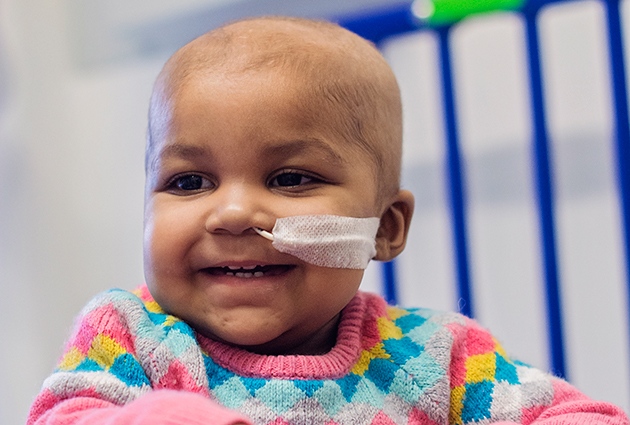With genetic tweaks and snips, researchers created cancer-busting
immune cells that, so far, seem to have wiped out a life-threatening
form of leukemia in a one-year-old girl.
The new cells are one-size-fits-all, beating out earlier cell-based cancer therapies that required custom engineering of each patient’s own immune cells. If proven effective in more trials, the new, generic cells could offer an easy, off-the-shelf treatment for life-threatening forms of leukemia.
“It is something we’ve been waiting for,” said Stephan Grupp, a professor of pediatrics at the University of Pennsylvania who was not involved with the research. Previous methods requiring engineering cells, specifically T cells, from every single patient could be slow, costly, and impossible in some patients with low T-cell counts. “The innovation here is gene-editing T cells so that one person’s T cells could be given to another even if they are not a donor match,” he said in a statement.
The first person to get the new cells, which came from a healthy donor, was a little girl named Layla, who suffered from a deadly form of cancer called acute lymphoblastic leukemia. Prior to the experimental cell therapy, she had tried all other treatment options. On Wednesday, her doctors announced that she appeared to be cancer free but will need to be monitored for a couple of years before it’s clear if she’s truly cured.
The T cells she received, engineered by Waseem Qasim of the University College London and his team, were modified to have an extra gene and two broken ones. The extra gene encodes a receptor called CAR19, which allows the T cell to recognize and kill cancer cells. The researchers broke two genes using a molecular method, called TALEN (transcription activator-like effector nucleases), that snips and inactivates genes. One slicing took out a gene for a receptor so that the engineered T cells wouldn’t attack healthy cells in the patient. The other gene slashing made the T cells immune to a powerful leukemia drug.
After a few weeks, Layla’s cancer appeared to be in remission, and the researchers are busy working on other trials of the therapy.
This approach fills a critical gap in the treatment of this type of leukemia, said Mark Osborn, a professor of pediatrics at the University of Minnesota and “serves as a springboard for clinical trials.”
Qasim and colleagues will present the results of Layla’s therapy December 5 at the annual meeting of the American Society of Hematology in Florida.
The new cells are one-size-fits-all, beating out earlier cell-based cancer therapies that required custom engineering of each patient’s own immune cells. If proven effective in more trials, the new, generic cells could offer an easy, off-the-shelf treatment for life-threatening forms of leukemia.
“It is something we’ve been waiting for,” said Stephan Grupp, a professor of pediatrics at the University of Pennsylvania who was not involved with the research. Previous methods requiring engineering cells, specifically T cells, from every single patient could be slow, costly, and impossible in some patients with low T-cell counts. “The innovation here is gene-editing T cells so that one person’s T cells could be given to another even if they are not a donor match,” he said in a statement.
The first person to get the new cells, which came from a healthy donor, was a little girl named Layla, who suffered from a deadly form of cancer called acute lymphoblastic leukemia. Prior to the experimental cell therapy, she had tried all other treatment options. On Wednesday, her doctors announced that she appeared to be cancer free but will need to be monitored for a couple of years before it’s clear if she’s truly cured.
The T cells she received, engineered by Waseem Qasim of the University College London and his team, were modified to have an extra gene and two broken ones. The extra gene encodes a receptor called CAR19, which allows the T cell to recognize and kill cancer cells. The researchers broke two genes using a molecular method, called TALEN (transcription activator-like effector nucleases), that snips and inactivates genes. One slicing took out a gene for a receptor so that the engineered T cells wouldn’t attack healthy cells in the patient. The other gene slashing made the T cells immune to a powerful leukemia drug.
After a few weeks, Layla’s cancer appeared to be in remission, and the researchers are busy working on other trials of the therapy.
This approach fills a critical gap in the treatment of this type of leukemia, said Mark Osborn, a professor of pediatrics at the University of Minnesota and “serves as a springboard for clinical trials.”
Qasim and colleagues will present the results of Layla’s therapy December 5 at the annual meeting of the American Society of Hematology in Florida.

No comments:
Post a Comment